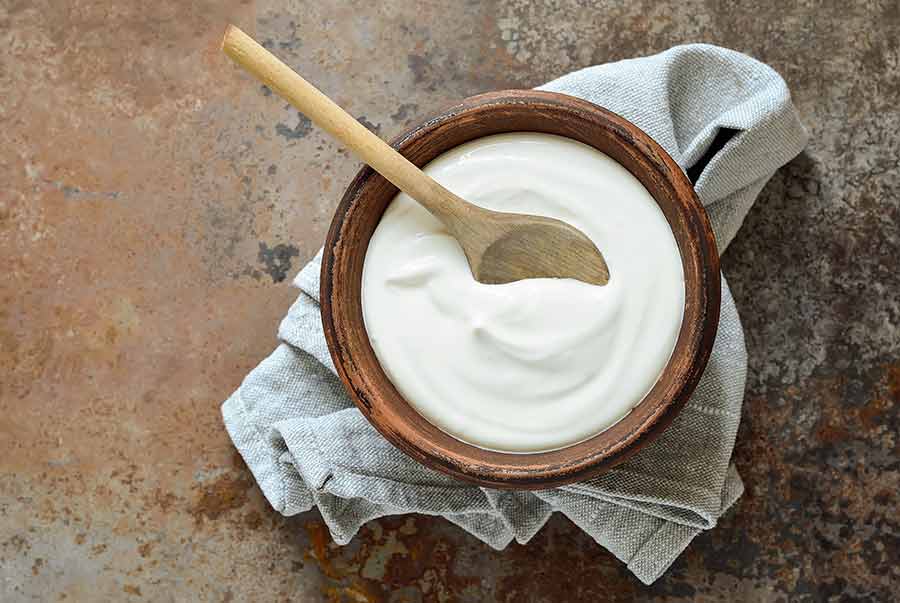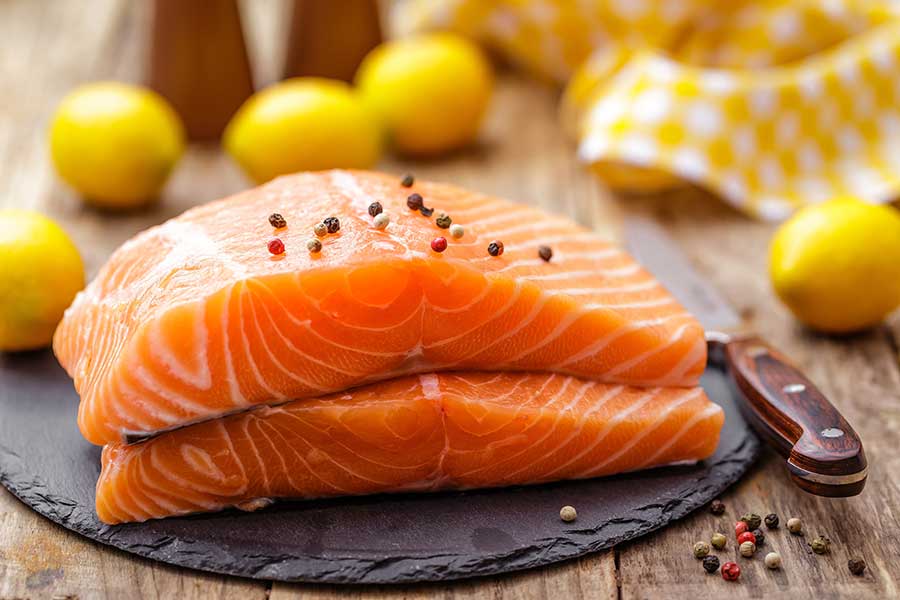- Home
- Leisure & Lifestyle
- Food & Drink
- 8 healthy and filling evening snacks
We’ve all been there. It’s late in the evening, dinner’s over, and we should be winding down for bed – but we start feeling peckish. Should we head to the kitchen and grab something to eat or tough it out until morning?
Most of us have heard that you shouldn’t eat too close to bedtime, and research suggests doing so regularly could have some adverse effects on our weight and sleep.
But the occasional healthy evening (or even midnight) snack is unlikely to make much difference to your health. Plus, if you’re feeling hungry before bed, your body might be hinting that you haven’t eaten enough that day – so there’s no need to suffer until breakfast.
With this in mind, we’ve pulled together a list of eight healthy foods that’ll hopefully keep you satisfied until morning, and may even help you sleep better.
The science behind snacking in the evening

Late-night snacking has long been scrutinised, but why is that?
Some studies suggest that eating within an eight to 12-hour window during the day can be beneficial for preventing conditions like heart disease and type 2 diabetes by helping to regulate our body clock.
There are also discussions about how eating late in the evening can impact our sleep and weight.
The impact of late-night snacking on weight
There’s mounting evidence to suggest that regularly eating late in the evening or at night can lead to weight gain.
For example, this study looked into the effects of two different meal patterns. The first pattern involved eating meals earlier in the day, with the last meal eaten approximately six and a half hours before bed. In the second, participants ate their meals later, having dinner approximately two and a half hours before bed.
The results found that the second pattern led to increased feelings of hunger the following day, as well as a reduction in the number of calories burned. This study found similar results.
The reason for this isn’t entirely clear, though some experts say it’s to do with how our circadian rhythm affects metabolism, nutrient absorption, and insulin sensitivity.
The impact of late-night snacking on sleep
Eating late at night has also been linked to disrupted sleep.
This study found that the more people ate in the evening – especially foods high in fat – the worse their sleep was. Specifically, it revealed that they spent less time in REM sleep (one of the most restorative stages of the sleep cycle) and had more difficulty falling and/or staying asleep.
Plus, if you’re prone to experiencing acid reflux, the combination of eating before bed and lying down can trigger heartburn, which can disrupt sleep.
The verdict – is late-night snacking bad for us?
Before we move on to ideas for healthy evening snacks, it’s worth pointing out that the occasional late-night snack is unlikely to have major consequences for your health. So, while being conscious of these findings can be useful, you don’t necessarily need to start making big changes to your eating habits.
Some health experts even suggest that eating certain foods before bed is perfectly healthy and can actually improve sleep and aid weight loss.
That said, it’s generally agreed that certain foods are best avoided before bed. This includes spicy foods, caffeine, foods with high amounts of sugar, and processed carbs, as these may keep you awake and have little nutritional value.
Instead, it’s best to reach for something nutrient-dense, low in calories, high in protein and/or fibre, and minimally processed (ideally a whole food), like the suggestions below…
8 healthy and filling evening snacks
1. Pistachios

Pistachios have a high fibre and protein content, which means they can keep you full for longer.
Pistachios are a particularly good choice for late-night snacking because of the amount of melatonin they contain. Melatonin is a hormone that helps to control and regulate sleep patterns – and eating it before bed can help us to fall asleep faster and stay asleep for longer.
Nuts in general are known for their high melatonin levels, and pistachios contain the most. Plus, prising open the shells before bed can be tiring in itself!
2. Cottage cheese

Whole foods that are high in protein and low in carbohydrates make excellent evening snacks. This is because protein takes longer than carbohydrates to digest, meaning it can keep you feeling satisfied until breakfast.
This makes cottage cheese a great before-bed snack. Low-fat varieties made from 1% milk can pack a whopping 14g of protein.
Research also suggests that eating 30g of protein half an hour before bed could boost muscle growth and metabolic rate throughout the night – meaning that it may even contribute to how efficiently you burn calories while at rest.
Cottage cheese can be a little plain on its own, so why not combine it with a sprinkling of berries, a sliced banana, and/or nuts? This article from Simple Nourished Living has more suggestions on creative ways to eat it.
3. Kiwis

Another food that’s low in calories and may help us sleep better is kiwi. This study found that people who ate kiwi one hour before bed for a month experienced a 35% reduction in the time it took for them to fall asleep.
They also reported better sleep quality. The reason for this is unclear, but it may be linked to the high serotonin levels in kiwis. Serotonin is a neurotransmitter that’s essential for regulating sleep.
An average-sized kiwi delivers 15% of our daily intake of fibre and twice as much vitamin C as an orange.
4. Porridge

Porridge is a tried and tested breakfast choice – but did you know it makes a delicious evening snack, too?
Packed full of fibre, oats will hopefully keep you full until morning and, like nuts, they’re a good source of melatonin. But this isn’t their only sleep-promoting ingredient. Oats also contain the amino acid tryptophan, which is converted to serotonin when it reaches the brain.
If plain porridge sounds a bit boring, try stirring some cinnamon in for a warm and comforting pre-bed snack, or a dash of raw honey, which is thought to have sleep-promoting properties of its own.
5. Greek yoghurt

In the evenings, many of us turn to sweet things like desserts or biscuits. However, high-sugar foods are some of the worst things we can eat before bed – not only because they’re high in calories and won’t keep us full for long, but because sugar may disturb sleep.
For something that feels like a treat, yet is low in calories and full of nutrients, why not have some Greek yoghurt? Greek yoghurt is high in protein and calcium, which helps the brain produce melatonin.
If simple Greek yoghurt seems uninspiring, why not add a few nuts or berries? This article from Ochsner Health has some helpful suggestions for tasty and creative ways to enjoy it, including my personal favourite – freezing it into creamy ice lollies.
6. Eggs

This eggcellent option may be a breakfast favourite, but it also makes for a quick, easy, and nutritious evening snack.
Two average-sized eggs contain approximately 12g of protein and a range of sleep-inducing ingredients – such as tryptophan, melatonin, and vitamin D.
You can enjoy your evening eggs poached, fried, or however you like. However, keeping a few hard-boiled ones in the fridge is a handy, fuss-free way to satisfy hunger pangs as soon as they arrive. Why not give one of our quick and easy egg recipes a try?
7. Bananas

There’s a reason why bananas are a tried and tested healthy snack. They’re low in calories and are great for keeping hunger at bay. This has a lot to do with the fact that they’re packed full of pectin, a soluble fibre found in fruits and vegetables that increases feelings of fullness.
Plus, bananas have relatively high levels of tryptophan and magnesium, which help promote sleep by increasing the production of melatonin. Magnesium also decreases cortisol levels. Cortisol is known as ‘the stress hormone’, and it can keep you awake.
Unlike sugary, fast-digesting carbohydrates in snacks like cakes and biscuits, higher-fibre carb options like bananas are slower to digest. They also won’t cause sharp spikes in your blood sugar levels – something that can make it more difficult to fall asleep.
If you’re in the mood for something a little more interesting, some people enjoy pairing banana with almond butter. This isn’t only tasty, but it’ll give you an extra helping of magnesium and melatonin.
8. Oily fish

Oily fish – like mackerel, tuna, salmon, and sardines – are superfoods and will serve you well when you feel hungry just before bed. They’re high in protein and rich in key nutrients – particularly vitamin D and omega-3 fatty acids, which are understood to help with sleep.
These tuna salad cucumber cups are a tasty way to enjoy fatty fish late at night, without worrying about eating a load of carbs. Mackerel on whole wheat toast is another popular option.
Final thoughts…
Next time you feel yourself fighting cravings late at night, why not reach for one of the eight foods listed here? They’re healthy, will hopefully keep you full until the morning, and might even help you drift off.
For more information, head over to our diet and nutrition section. Or, for recipe inspiration, you’ll find plenty in the food and drink section.
Do you consistently find yourself hungry before bed? If so, what’s your favourite go-to snack? We’d love to hear from you in the comments below.
Sam McLoughlin is a Senior Lifestyle Writer at Rest Less. He joined the editorial team in 2021 after completing his Master’s degree in English Literature, Culture, and Theory at The University of Sussex. He enjoys writing about careers, books, sports, travel, and pretty much anything that his editor will let him have a crack at, but his favourite part of the job is interviewing inspiring people – from activists and CEOs to later life career changers. In his spare time, Sam enjoys climbing, snowsports, and going to see live music.
* Links with an * by them are affiliate links which help Rest Less stay free to use as they can result in a payment or benefit to us. You can read more on how we make money here.
